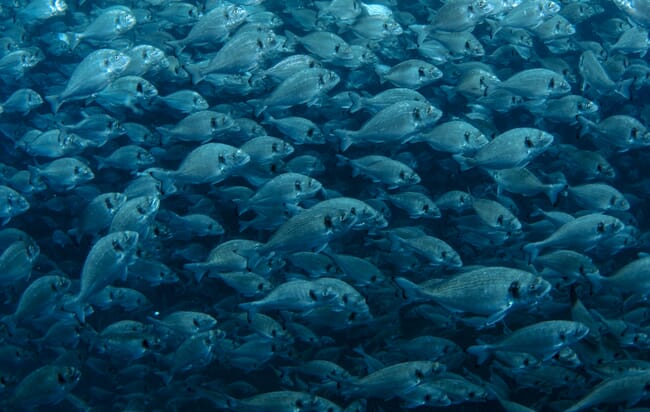
Nutrition and selective breeding have been essential to the successful growth of global aquaculture to 90 million tonnes per year, but gut microbiota are now also seen as having a crucial role. Analysing the gut microbiota could reveal the nutritional and health condition of farmed fish, helping to design innovative feeds for sustainable aquaculture.
Starting in 2019, a group of researchers from the AquaIMPACT EU project found several interesting results pointing to the relationship between fish gut microbiota and fish growth, nutrition and genetics.
With a focus on farmed fish of high economic value for European aquaculture (European sea bass, gilthead sea bream and rainbow trout), the project considered the effects of new feeds on the gut microbiota of fish with different genetic backgrounds. For instance, they looked at alternative substitutes to fish meal and fish oil, such as microalgae oils and a wide range of feed additives, such as phytobiotics, organic acids and probiotics.
Healthier bacteria help in improving absorption and bioavailability of nutrients. The AquaIMPACT project found that increased beneficial bacteria could lead to an improved utilisation of future alternative feeds in genetically selected European sea bass and gilthead sea bream for improved growth.
Data also shows that core gut microbiota change with age, sex and season. However, they found that in genetically selected fish, the core gut microbiota was less variable and homogeneous with diet changes. Instead, the microbiota of selected fish adapted their function better while maintaining their composition.
Hence, in an increasingly challenging and unpredictable environment, establishing a healthy core microbiota that provides metabolic plasticity could be the key to mitigating the impact of climate change on farmed fish.
Background
With 12 research and 10 industry partners, AquaIMPACT is a European project that unites the efforts of multiple research groups in the field of nutrition and selective breeding. It counts on microbiota tasks with:
- Nutrigenomics and fish pathology groups of IATS-CSIC in Castellón, Spain
- Aquaculture research unit of the University of Insubria in Varese, Italy
- IU-ECOAQUA at Las Palmas de Gran Canaria University in Canary Islands, Spain
- Feed producer company, Skretting Aquaculture Research Center
- Fish feed additive Company, INVE
Further research is underway on fish gut microbiota in other research projects. For instance, the starting Spanish national project ThinkInAzul aims to develop online genomic tools to predict how fish gut microbiota is altered in different production systems.




